Archbishop Lori Investigates Bishop Bransfield’s Mess and Ends Up With One of His Own
Bishop Bransfield’s lifestyle was too transparent. Archbishop Lori’s investigation of him wasn’t transparent enough.
Bishop Michael J. Bransfield is the retired bishop of the Wheeling-Charleston, West Virginia diocese. He currently lives near Philadelphia, PA. Pope Francis accepted his resignation eight days after he turned 75 in September 2018. Bransfield was appointed bishop by Pope Benedict XVI in 2005. West Virginia is one of the poorest states in the U.S., and has very few Catholics, about 78,000 or just 4% of the population. Before he was named bishop, Bransfield was the rector of the Basilica of the Shrine of the Immaculate Conception in Washington, DC from 1990 to 2005. He arrived in West Virginia with a reputation for enjoying a “party atmosphere” from his time in Washington. Bishop Bransfield was a regular visitor to the Vatican. In 2010 he presented a cake to Pope Benedict for the pope’s 83rd birthday. He was elected president of the Papal Foundation by his fellow clerics. This nonprofit distributes millions of dollars to charitable projects on the pope’s behalf.
A few days after Bishop Bransfield’s retirement Pope Francis appointed Archbishop William E. Lori of Baltimore, Maryland as apostolic administrator, with a mandate to investigate allegations of sexual harassment of adults and financial improprieties by Bishop Bransfield.
Archbishop William E. Lori is the archbishop of the Baltimore, Maryland archdiocese and metropolitan for the region. He was appointed archbishop of Baltimore by Pope Benedict XVI in 2012. In the 1990s, he served as secretary, chancellor, moderator of the curia, and vicar general to James Cardinal Hickey, Archbishop of Washington, DC who was a rabid tormenter of New Ways Ministry, a positive LGBT Catholic ministry. In 2001, Lori was appointed bishop of Bridgeport, Connecticut. While serving in Bridgeport, Lori fought against releasing the names of diocesan priests who were being sued for sexual abuse. Since then, he has gone up the U.S. Conference of Catholic Bishops career ladder rung by rung. He is the former chairman and current member of the USCCB Committee on Doctrine; Ad Hoc Committee on Universities and Colleges, Committee on Pro-Life Activities, Ad Hoc Committee for the Defense of Marriage, Ad Hoc Committee on Sexual Abuse, and chairman of the Ad Hoc Committee for Religious Liberty.
I encountered Bishop Lori in 2007, when he was still in Bridgeport but serving as the chair of the USCCB committee on Doctrine. The Vatican had recently published Ministry to Persons with a Homosexual Inclination: Guidelines for Pastoral Care. This document was extremely hurtful and negative to lesbian and gay Catholics. Along with another couple, my wife and I sent a letter to Bishop Lori describing our feelings about it and expressed a wish to meet with him face-to-face to discuss our lives as Catholic lesbians and mothers. We received a terse letter in reply, very dismissive and cutting in tone, telling us to reread the document and read the Catechism of the Catholic Church.
Archbishop Lori’s Investigation
Archbishop Lori’s investigation was probably sparked by an 8-page letter with supporting documents he received in August 2018 from Monsignor Kevin Quirk, Bransfield’s own judicial vicar. The letter detailed Bransfield’s monetary gifts. “It is my own opinion,” Quirk stated, “that (Bransfield) makes use of monetary gifts, such as those shown above, to higher ranking ecclesiastics and gifts to subordinates to purchase influence from the former, and compliance or loyalty from the latter.” Besides documentation on cash gifts, the letter details prescription drug and alcohol abuse by Bransfield, and explosive testimonies from young priests who worked as assistants to Bransfield, along with a third priest who had been offered the job, describing unwanted sexual advances, groping, and sexual abuse.
Shortly after Bransfield’s retirement, Pope Francis appointed Archbishop Lori to oversee an investigation into the charges. He and his team of five lay people completed a 60-page report of their findings in February 2019. It was forwarded to the Vatican for review and action. The report was made public on March 11, 2019 by the Archdiocese of Baltimore. The team examined multiple allegations of sexual harassment and suspicious financial records. They interviewed more than 40 people, including Bishop Bransfield. After the report was released Archbishop Lori announced restrictions on Bishop Bransfield’s ministry.
But it wasn’t over. Archbishop Lori made a few serious mistakes, and the investigation of Bishop Bransfield, already messy and potentially embarrassing, snowballed into a genuine financial and sexual scandal.
Archbishop Lori’s First Mistake
Archbishop Lori edited the final report to the Vatican, omitting the cash gifts given to him by Bishop Bransfield and 11 other high-ranking Vatican and U.S. clerics. His reasoning: the list of recipients would be a “distraction.” His edits came to light as part of a June 5, 2019 story by The Washington Post into the Bransfield case. Reporters were able to obtain both the original and final drafts of the report and a comparison of the two revealed the deletions. The investigators on Lori’s team did not raise any objection to his request to exclude mention of the gifts to cardinals and other church officials. After the redaction was published by The Washington Post, Archbishop Lori had a change of heart. He said, “looking back on this in hindsight, I would say this judgement call was a mistake.”
Also noteworthy, only after publication of The Washington Post expose did Archbishop Lori refunded $7,500 of the $10,500 he received from Bishop Bransfield to Catholic Charities of the Wheeling-Charleston, West Virginia diocese.
Archbishop Lori’s Second Mistake
Archbishop Lori, as metropolitan of the region, had received complaints from Catholics in the diocese about Bishop Bransfield for six years prior to his investigation. He never did anything about them and didn’t mention them in his report.
On July 3, 2019 The Washington Post reported that concerns about Bishop Bransfield’s profligate spending were raised with senior Church authorities in the United States and Rome as early as 2012. Catholics in the diocese sent letters and emails to Archbishop Lori and the former apostolic nuncio, Archbishop Carlo Maria Vigano asking them to investigate Bishop Bransfield’s lifestyle and leadership. They were ignored.
Archbishop Vigano—whose histrionics about Cardinal Theodore McCarrick’s abuse of young priests and seminarians made the news repeatedly in 2018 and 2019—also received complaints about Bishop Bransfield. One parishioner, Linda Abrahamian from Martinsburg, West Virginia, wrote to him in 2013: “I beg of you to please look into this situation.” Vigano confirmed to The Washington Post that he had heard “rumors” about Bransfield’s sexual misconduct, but that they had never been “substantiated.” “Unfortunately, I do not recall having received any letter of this nature,” Vigano said, “which I would certainly remember and which I would have followed up on. That being said, the Nunciature receives many complaints every single day about all sorts of things, and it is probable enough that unfortunately this letter was not considered to be serious enough to be brought to my attention. However, the letter, if it was received, is probably filed in the archives of the Nunciature, thus it may be verified.”
I bet. Vigano is the same official who tried to quash an investigation into Minneapolis Archbishop John Nienstedt, who also had a predilection for seminarians and young priests. In 2014 Vigano ordered that documents implicating Nienstedt in an independent sex abuse investigation be destroyed.
Bishop Bransfield’s Gifts
In his 13-year reign Bishop Michael J. Bransfield gave cash gifts to fellow clerics totaling $350,000. He wrote personal checks and was reimbursed with church money. Bransfield sent the checks, many for amounts in four figures, to 137 clergymen, including two young priests he is accused of sexually harassing and more than a dozen cardinals. Some of the “gifts” were for delivering sermons or speeches, other checks were for birthdays or Christmas. Many did not have a notation. The recipients of the largest amounts were among the most influential men in the church in the U.S. and Rome. They included:
Archbishop William E. Lori (archbishop of Baltimore) – $10,500
Archbishop Carlo Maria Vigano (former papal nuncio to U.S.) – $6,000
Cardinal Raymond Burke (former Prefect of the Supreme Tribunal of the Apostolic Signatura) – $9,600
Cardinal Donald Wuerl (former archbishop of Washington, DC) – $23,600 ($10,000 for a church in Rome)
Cardinal Timothy Dolan (archbishop of New York)-
Cardinal Kevin Farrell (Prefect of the Dicastery for the Laity, Family and Life)- $29,000 (for renovations on Rome apartment)
Cardinal Bernard Law (former archbishop of Boston, Archpriest of the Basilica di Santa Maria Maggiore)- $4,800
Archbishop Peter Wells (former official at the Secretariat of State)
Rev. Michael Weston, Monsignor Walter Rossi, Monsignor Vito Buonanno – Basilica of the National Shrine of the Immaculate Conception (Rossi succeeded Bransfield as rector) – collectively $10,800
Monsignor Kevin Irwin (former head of the theology department, Catholic University of America) – $6,500
Rev. Pietro Sambi (former apostolic nuncio to U.S.) – $28,000
Rev. Richard Mullins (priest in Washington, DC)
Rev. Sean Bransfield (nephew, vice chancellor of the archdiocese of Philadelphia) – $9,175
Monsignor Brian Bransfield (nephew, general secretary, US Conference of Catholic Bishops) – $1,350
Cardinal Edmund Szoka (top Vatican official) – $500
Bishop George V. Murray (Youngstown, Ohio diocese) – $3,000
Men who accused Bishop Bransfield (during and after alleged sexual misconduct) – $50-$300
Rev. Frederick P. Annie, Vicar General, Diocese of Wheeling-Charleston, WV (Bransfield’s most senior aide) – The three men who held the role received a total of $38,000)
A breakdown of Archbishop Lori’s gifts showed he was given $5,000 when appointed archbishop of Baltimore, $3,000 for travel expenses and honoraria for preaching at two Red Masses in the Diocese of Wheeling Charleston (an annual event to pray for those in the judicial and legislative branches of government) and the rest as $500 gifts given on the holidays.
Even though it is not common practice for bishops to give cash gifts, “usually, if anything, it’s a poinsettia at Christmas or lilies at Easter,” Lori said, he “simply (thought) Bransfield was being generous and kind” when he gave him money. “I didn’t think much more about it than that.”
Nary a thought flickered across his mind…a $5,000 gift from the bishop of one of the poorest dioceses in the U.S.?
Bishop Bransfield – Where the Money Came From
Bishop Bransfield had his own cash kitty to play with – an endowment to the diocese of oil-rich land in Texas that generated an average of $15 million annually.
The roots of this unusual wealth for the diocese date back to the late 1800s, to a friendship struck on a transatlantic cruise ship between a bishop from Wheeling and a New York heiress. When she died in 1904, Sara Catherine Aloysia Tracy left most of her estate to the diocese, including a large tract of land in west Texas. Oil was discovered there decades later.
The income generated from mineral rights generates an average of $15 million a year, funding an endowment of nearly $230 million. Bishop Bransfield wrote checks from his personal account and had the endowment reimburse him. He used over $2.4 million on travel, much of it personal, flying in chartered jets and staying in luxury hotels. He had a private chef. He also used $324,000 for clothing, jewelry and “personal services.” The diocese paid $4.6 to renovate his residence.
According to the report, Bishop Bransfield and several subordinates spent an average of $1,000 a month on alcohol. When Bransfield was not traveling, fresh flowers were delivered daily to the chancery, at the cost of $100 a day, almost $182,000 in total. Bransfield’s spending reminds me a lot of the former archbishop of Newark, NJ, John J. Myers, another pleasure-loving prelate in a poor diocese. A contemporary of Bransfield, Myers also enjoyed destination vacations and lavish spending on his residence.
Why was Bishop Bransfield able to get away with it for so long? He was nasty, vindictive and intimidating. The men around him were afraid for their positions and careers. They did nothing and said nothing.
A partner at the auditing firm hired by Bransfield told investigators he was “afraid to challenge Bishop Bransfield’s decisions because of the bishop’s position and his overall demeanor.” The diocesan staff said and did nothing out of fear of retaliation and retribution. They opted to protect their positions and careers. Bishop Branfield’s two top aides, Monsignor Kevin Quirk, the judicial vicar, and vicar general Rev. Frederick P. Annie, discussed concerns about the bishop’s conduct with young men but did nothing to stop it, the report said. “Tell it to the Nuncio,” Annie said when Quirk raised the issue. Annie acknowledged to investigators that taking a complaint about the bishop to the nuncio would have been “career ending.”
Intervention would also have ended their cash gifts. Vicar General Annie, and the two other men who served in the position, received $38,000. Pietro Sambi, papal nuncio from 2005-2011 took in $28,000 over the years. Carlo Maria Vigano, papal nuncio from 2011-2016 got $6,000 during that period. There is no mention of Pope Francis’ appointee, Archbishop Christophe Pierre (2016-present). Perhaps he didn’t take the bait.
Bishop Bransfield – Life as a Gay Bishop
Archbishop Lori outlined details of what the investigation had found about Bishop Bransfield’s piggish behavior: “The team uncovered a consistent pattern of sexual innuendo and covert suggestive comments and actions toward those over whom the former bishop exercised authority.”
The report cites nine men in the Wheeling-Charleston diocese who accused Bransfield of running his hands over their genitals, kissing them, exposing himself, and commenting on their sexual attractiveness. Diocesan officials witnessed Bransfield’s “predatory” behavior toward altar servers, a tendency troubling enough that Monsignor Quirk tried to make sure that no altar server was left alone with him.
One seminarian recalled sitting on Bransfield’s lap, being kissed by the bishop and thinking, “I either do this or completely reinvent my life.” Bransfield asked him to take his pants off.
Seminarians and young priests asked for help. They were instructed instead to “make your boundaries clear,” or told they had no choice but to join Bishop Bransfield on trips or sleepovers at his residence. Bransfield used alcohol, oxycodone and other prescription drugs, which “likely contributed to his harassing and abusive behavior,” the report states.
In an interview with The Washington Post, Bishop Bransfield disputed the allegations, saying “none of it is true,” but declined to go into detail since his attorneys had advised him not to comment. “Everybody’s trying to destroy my reputation,” Bransfield said without elaborating. “These people are terrible to me.”
In his June 5, 2019 letter to priests and lay faithful of the Wheeling-Charleston diocese, Archbishop Lori remarked: “I am deeply pained by and sorry for the harm that the former bishop caused to those he was charged with shepherding in a spirit of Christ-like humility, service, pastoral care and charity. There is no excuse, nor adequate explanation, that will satisfy the troubling question of how his behavior was allowed to continue for as long as it did without the accountability that we must require of those who have been entrusted with so much – both spiritual and material – as bishops and pastors.”
Archbishop Lori’s words are strong and clear. Now, the hard part. Bishops need to get tough with rogue bishops—thieves, liars, sexual abusers and men who don’t practice what they preach. They need to confront them, and they need to eliminate them from their ranks. No more live and let live and looking the other way. Starting with you, Archbishop Lori! This is also true for diocesan officials. All too often the desire for a cushy career outweighs their sense of decency. Get some backbone. Blow the whistle on corrupt prelates that are a cancer and rot on the faith.
Update – A Penthouse, Limousines and Private Jets: Inside the Globe-Trotting Life of Bishop Michael Bransfield – from Hear Our Voices, The Gay Catholic Priests’ Blog.

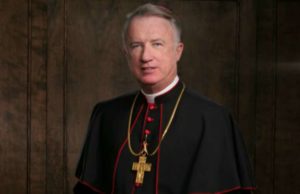
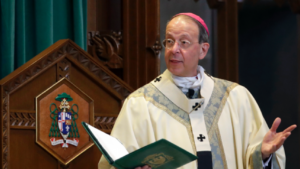
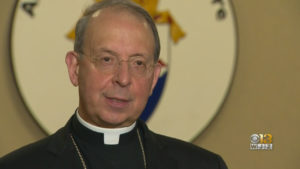
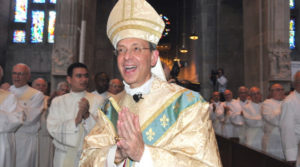
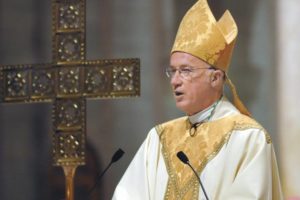
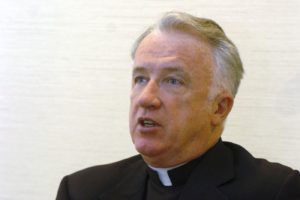
July 8th, 2019 at 1:17 pm
Thank you Karen for bringing all that together. Amazing stuff. Jesus would have thrown these guys out of the temple and Francis should now do so.Be interesting to see how many worldwide would be left standing if he did.
July 8th, 2019 at 4:09 pm
Hi Polo, I have to admit to moments of Schadenfreude writing about Archbishop Lori’s misfortune. Bad me. I’m sure he just told Bransfield to get out of town–he didn’t give him a lecture on homosexuality–he saves that for lay people who are powerless against church bureaucrats.
July 9th, 2019 at 4:54 pm
Transparency is the key.
Keep up the good work.
Spread the Gospel 🙂
July 29th, 2019 at 9:22 am
Thanks Karen for truly excellent work. Bishop Lori is as deep in it as Bransfield. The Washington Vicar General Charles Antonicelli can give all the details of their gay rendezvous in Rome while he was a resident student at the North American College, and Lori was Cardinal Hickey’s private secretary. Lori’s relationship with a Washington archdiocesan Brazilian seminarian was general knowledge, till he dumped him and had Hickey kick him out.
As for Bransfield, many additional juicy details can surely be given by Cuban-American Richard Mullins, ex-Arlington diocesan priest, how incardinated in Washington DC, who was himself recipient of some $38,000 cash gifts by Bransfield, and who has had a long-standing homosexual relationship with Bransfield from his days as an altar server at the National Shrine, then as a seminarian at Mount Saint Mary’s, then as a priest, first in Arlington, and now in Washington. The tree is rot!
July 31st, 2019 at 6:29 am
Hi James, thank you for writing! If the U.S. Bishops really wanted to clean house they could do it right now. Individually they could forward to Rome the names of all the bishops they know who have had or are having homosexual affairs and relationships; relationships with women; who protected sexual predators and offenders. Let Rome investigate, or, even a professional investigation service like Kroll or one of its competitors. I would have some lay involvement, but not totally lay run since those members could have an agenda and protect some offenders. Of course, bishops won’t do this, because I suspect too many of them are involved, would be outed, and the US church would blow up. The conservative bishops like Archbishop Lori are especially protective of the status quo. As a starter, I would recommended that the Vatican investigate all the bishops, officials and priests on Bramfield’s gift list. Let’s see where the money leads.
October 30th, 2019 at 9:06 am
Thank you for this fine summary of the Bransfield story.
I am curious why I keep seeing this claim repeated in various places, though:
“The report was made public on March 11, 2019 by the Archdiocese of Baltimore.”
The Bransfield report has not been made public. Lori released a “summary” of the report, and his summary omits many key parts of the report itself, including the investigators’ opinion that allegations that Bransfield abused minors in Philadelphia in the ‘70s be examined again.
See my story on this here: https://www.washingtonpost.com/religion/2019/08/02/too-many-questions-remain-unanswered-case-west-virginia-bishop-michael-bransfield/
October 30th, 2019 at 9:37 am
Archbishop Lori never released the report of the internal church investigation into Bransfield( as stated in the article).. Lori refused to release or share it, even after the Attorney General of West Virginia directly asked for a copy so the AG could determine if there had been criminal activity within his state. Lori claimed he could not share it because it belonged to the Vatican and said only they could share it. The West Virginia AG currently has a civil lawsuit filed against the Wheeling-Charleston diocese, claiming they violated consumer protection laws by taking tuition for private schools that broke state laws by failing to do background checks on employees. They had some known abusers working in the school system in the past. Lori should release the report – but he refuses to do so.
October 30th, 2019 at 12:08 pm
Dear Michael and Abbie, Thank you for commenting with corrections to my blog post. I hope the Vatican releases the report. I also hope the state A.G.’s go after both Archbishop Lori and Bishop Branfield’s with every tool at their disposal. The hierarchy has to be made to stop protecting clerics, and others in their supervision or employ who lie, steal, act immorally and break the law. Since bishops cannot be trusted or relied upon to police themselves, secular authorities need to do so.